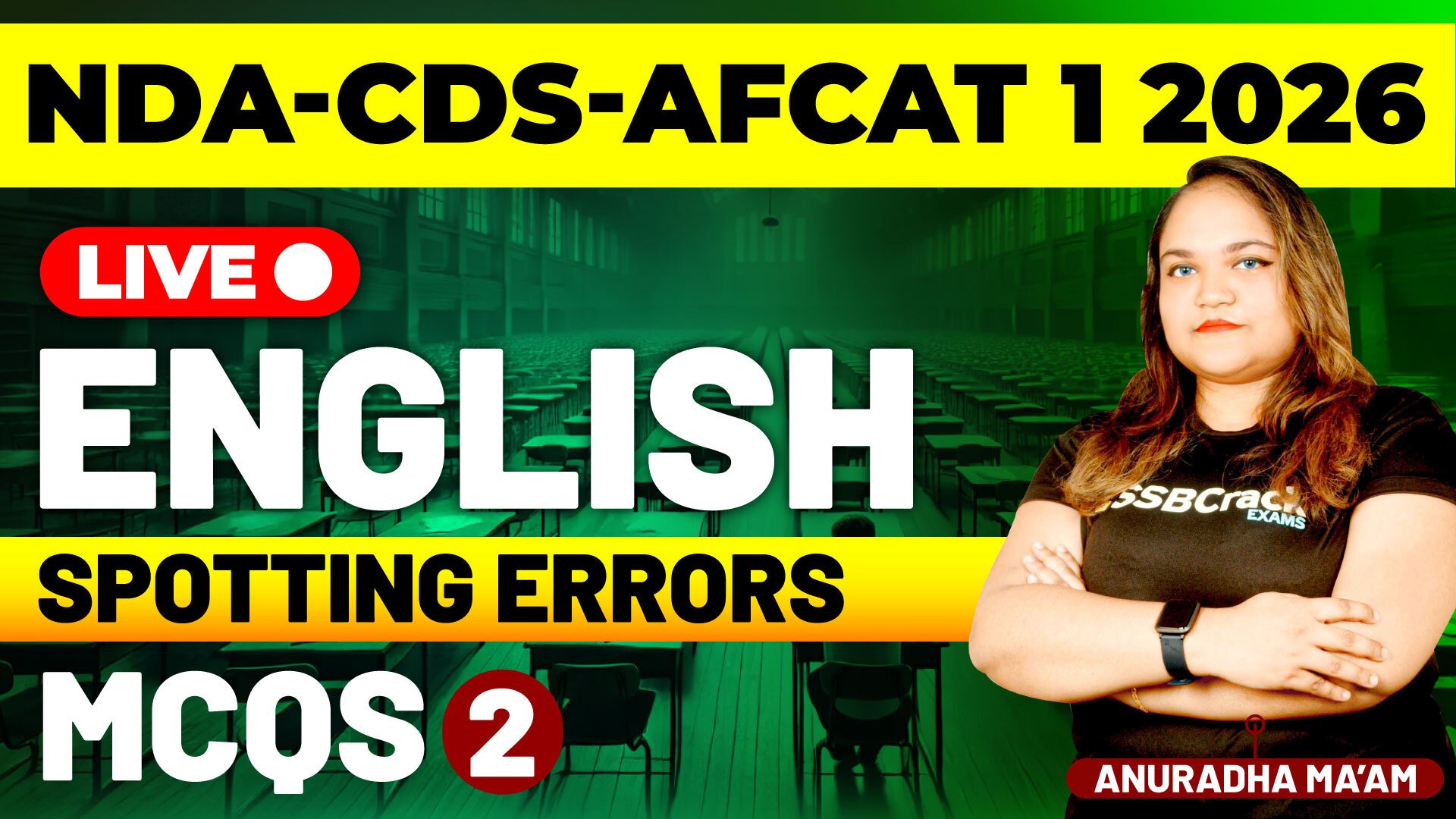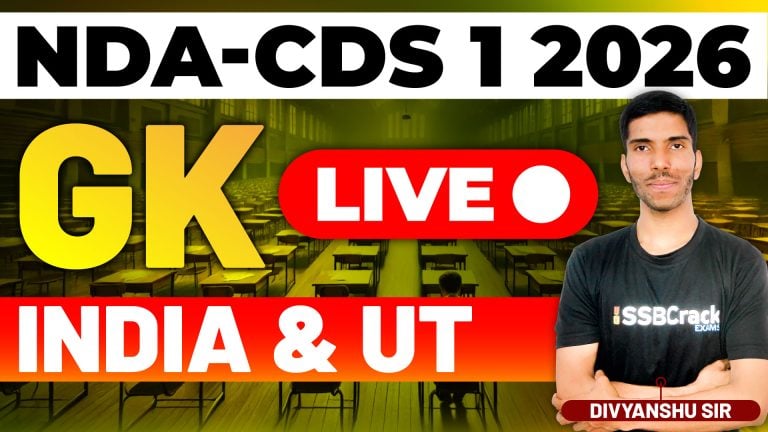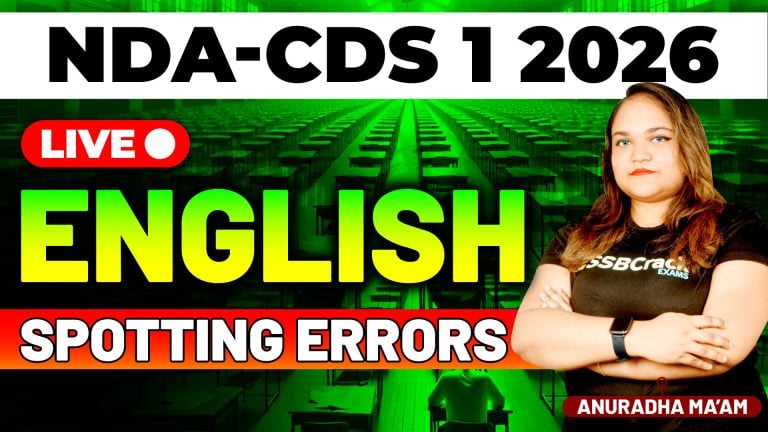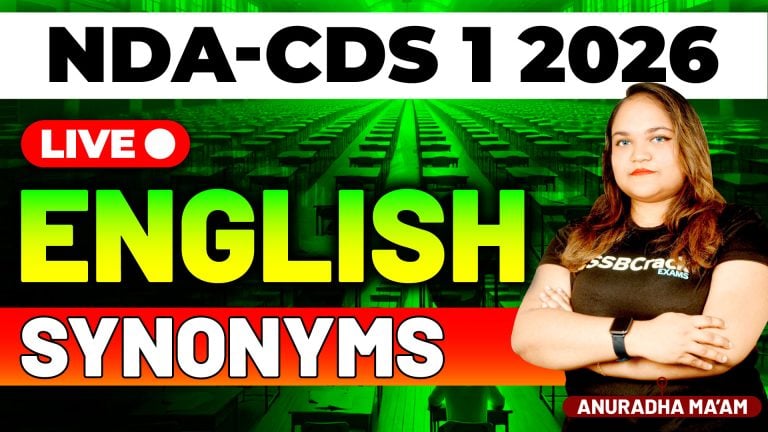The NDA, CDS & AFCAT 1 2026 English Live Class 2 on “Spotting Errors” was conducted as part of the advanced grammar practice series designed to refine aspirants’ error detection and sentence correction skills. Building on the fundamentals covered in the first session, this class focused on high-level MCQs, rule-based analysis, and frequently repeated patterns from previous year NDA, CDS, and AFCAT papers. The objective was to help candidates identify even subtle grammatical mistakes with accuracy and speed — a key requirement for cracking the English section in defence exams.
Objective of Spotting Errors Class 2
The second live class aimed to:
- Strengthen conceptual understanding of grammar through applied MCQ practice.
- Highlight common error patterns that recur in NDA, CDS, and AFCAT exams.
- Train aspirants to analyze sentence parts logically, not just grammatically.
- Build exam temperament through timed question-solving drills.
Spotting Errors is a high-scoring area when approached with a rule-based mindset. The class used real exam-style questions to ensure aspirants could confidently recognize grammar traps within seconds.
Major Grammar Rules & MCQs Covered in the Class
During Spotting Errors Class 2, aspirants practiced a series of multiple-choice questions drawn from key grammar concepts. Below are the major topics and examples discussed in class:
1. Subject–Verb Agreement (Advanced Rules)
- Rule: Collective nouns, indefinite pronouns, and phrases joined by “as well as,” “along with,” etc., take singular verbs if the main subject is singular.
Example:
(A) The committee have decided to postpone the meeting.
(B) The committee has decided to postpone the meeting. ✅
Explanation: Committee is a collective noun; hence, a singular verb (has) is correct.
2. Sequence of Tenses
- Rule: When the main clause is in the past, the subordinate clause should also be in the past.
Example:
(A) He said that he will go tomorrow.
(B) He said that he would go the next day. ✅
Explanation: Tense agreement and reported speech rules are applied here.
3. Misplaced Modifiers and Adverb Position Errors
- Rule: Adverbs should be placed close to the words they modify to avoid confusion.
Example:
(A) She almost drove her children to school every day. ❌
(B) She drove her children to school almost every day. ✅
4. Prepositional & Article Errors
- Rule: Certain words take fixed prepositions; articles are omitted in specific contexts.
Example:
(A) He is good in English. ❌
(B) He is good at English. ✅
Example:
(A) Mount Everest is the highest mountain in the world. ✅
(B) The Mount Everest is the highest mountain in the world. ❌
5. Parallelism & Correlation Rules
- Rule: Paired conjunctions like either…or, neither…nor, both…and must connect grammatically parallel elements.
Example:
(A) He not only won the match but also the audience’s heart. ❌
(B) He won not only the match but also the audience’s heart. ✅
6. Common Usage & Redundancy Errors
- Rule: Avoid unnecessary repetition or incorrect idiomatic phrases.
Example:
(A) He returned back home late. ❌
(B) He returned home late. ✅
Key Highlights of Spotting Errors Live Class 2
The class adopted an interactive and practice-driven approach with emphasis on concept clarity and real-time learning.
Session Features:
- Topic-wise MCQs from past years and mock tests.
- Detailed rule explanation after every question.
- Error spotting tricks for faster elimination of wrong options.
- Live quizzes & timed polls for speed-building.
- Comprehensive notes on advanced grammar rules and exceptions.
Aspirants actively participated in identifying tricky patterns such as errors in tense consistency, wrong prepositions, and misplaced modifiers — all of which are favourites in UPSC and AFCAT papers.
Why Mastering Spotting Errors Is Crucial for Defence Aspirants
The ability to detect and correct grammatical errors reflects not just English proficiency but also clarity of thought, attention to detail, and decisiveness — qualities that are highly valued in a defence officer.
By regularly practicing Spotting Errors:
- Aspirants improve grammatical precision and sentence sense.
- They learn to avoid common exam traps and time wastage.
- Their overall English accuracy and confidence increase significantly.
Moreover, since many Cloze Test, Sentence Improvement, and Fill in the Blanks questions are indirectly based on the same rules, mastering this topic provides a comprehensive advantage in the English paper.
Conclusion
The NDA, CDS & AFCAT 1 2026 English Live Class 2 on Spotting Errors was a continuation of structured grammar training focused on applied MCQ practice and exam-oriented strategies. Aspirants learned to approach each question logically, apply grammar rules swiftly, and avoid common pitfalls.
Spotting Errors is not just a grammar exercise — it’s a test of precision, awareness, and language discipline. For every future officer, mastering this topic is essential for both exam success and professional communication.







